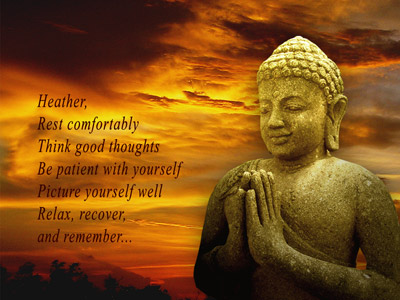Wednesday, February 29, 2012
Early Morning Buddhist Inspiration - 2/29/2012
Tuesday, February 28, 2012
LEAVING, AGAIN
TIME TO COME HOME
Early Morning Buddhist Inspiration - 2/28/2012
Early Morning Buddhist Inspiration - 2/28/2012
Monday, February 27, 2012
Lord Buddha Quotes






Even death is not to be feared by one who has lived wisely.
Just as treasures are uncovered from the earth, so virtue appears from good deeds, and wisdom appears from a pure and peaceful mind. To walk safely through the maze of human life, one needs the light of wisdom and the guidance of virtue.
Hatred does not cease by hatred, but only by love; this is the eternal rule.
Health is the greatest gift, contentment the greatest wealth, faithfulness the best relationship.
Lord Buddha Quotes
Holding on to anger is like grasping a hot coal with the intent of throwing it at someone else; you are the one who gets burned.However many holy words you read, however many you speak, what good will they do you if you do not act on upon them?
Just as a candle cannot burn without fire, men cannot live without a spiritual life.
I do not believe in a fate that falls on men however they act; but I do believe in a fate that falls on them unless they act.
I never see what has been done; I only see what remains to be done.
In a controversy the instant we feel anger we have already ceased striving for the truth, and have begun striving for ourselves.
In the sky, there is no distinction of east and west; people create distinctions out of their own minds and then believe them to be true.
It is a man's own mind, not his enemy or foe, that lures him to evil ways.
We are formed and molded by our thoughts. Those whose minds are shaped by selfless thoughts give joy when they speak or act. Joy follows them like a shadow that never leaves them.
We are shaped by our thoughts; we become what we think. When the mind is pure, joy follows like a shadow that never leaves.
All that we are is the result of what we have thought. If a man speaks or acts with an evil thought, pain follows him. If a man speaks or acts with a pure thought, happiness follows him, like a shadow that never leaves him.
Buddha
All things appear and disappear because of the concurrence of causes and conditions. Nothing ever exists entirely alone; everything is in relation to everything else.
Buddha
All wrong-doing arises because of mind. If mind is transformed can wrong-doing remain?
Buddha
Ambition is like love, impatient both of delays and rivals.
Buddha
An idea that is developed and put into action is more important than an idea that exists only as an idea.
Buddha
An insincere and evil friend is more to be feared than a wild beast; a wild beast may wound your body, but an evil friend will wound your mind.
Buddha
Early Morning Buddhist Inspiration - 2/27/2012

~Thich Nhat Hanh
Early Morning Buddhist Inspiration - 2/27/2012

~Thich Nhat Hanh
Sunday, February 26, 2012
MENDACITY
HUMAN BEINGS
Early Morning Buddhist Inspiration - 2/26/2012
Early Morning Buddhist Inspiration - 2/26/2012
Saturday, February 25, 2012
KEN PRICE
Friday, February 24, 2012
Early Morning Buddhist Inspiration - 2/25/2012
Early Morning Buddhist Inspiration - 2/25/2012
Early Morning Buddhist Inspiration - 2/24/2012
Early Morning Buddhist Inspiration - 2/24/2012
Thursday, February 23, 2012
A DAY WITH LUKA


Early Morning Buddhist Inspiration - 2/23/2012
Early Morning Buddhist Inspiration - 2/23/2012
Wednesday, February 22, 2012
CAA
Early Morning Buddhist Inspiration - 2/22/2012

~Thich Nhat Hanh
Early Morning Buddhist Inspiration - 2/22/2012

~Thich Nhat Hanh
Tuesday, February 21, 2012
College Art Association
Monday, February 20, 2012
PEACEFUL REVOLUTION
duty means taking responsibility for my actions and the problems I can help solve, and knowing I have a duty to serve others and make a difference. Honor means having integrity, being honest with myself and others, and treating people with respect. Country means being committed to and willing to sacrifice for something larger than myself.










